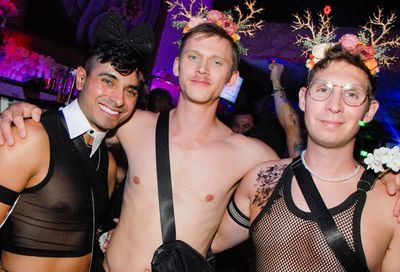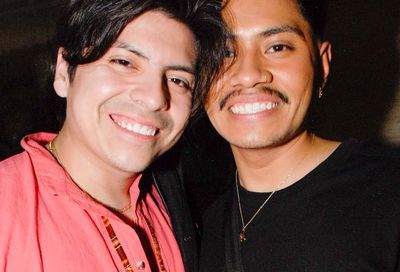Bolton's Strange Bedfellows
U.S. and Iran share homophobic alliance at U.N.
While global frictions between Western powers and Iran stemming from Iran’s nuclear ambitions are grabbing headlines daily, behind the scenes Iran has found common ground with at least one Western power: the United States. Shared homophobia has generated rapport between the two at the United Nations.
This case of ”strange bedfellows” centers on a Jan. 23 vote at the United Nations to deny two gay organizations recognition as official non-governmental organizations (NGOs) within the international body. The U.N. body that grants such recognition — the Economic and Social Council (ECOSOC) — has recognized nearly 3,000 NGOs, offering them the opportunity to participate in U.N. business. The International Lesbian and Gay Association (ILGA) and the Danish National Association of Gays & Lesbians (LBL) won’t be joining them, thanks, in part, to U.S. efforts.
”There’s a sense of outrage at seeing the United States ally itself with governments like this,” says Scott Long, who, as director of the LGBT Project at Human Rights Watch (HRW) and former program director for the International Gay & Lesbian Human Rights Commission (IGLHRC), has been monitoring the U.N. since 1997. ”We’re critical of most of these governments. Yet, when it comes to an issue like LGBT rights — basically of our right to live — we’re willing to side with them.”
During the Jan. 23 proceedings, there was an initial move led by Iran to dismiss the two applications prior to any discussion. The United States abstained from that vote before voting against the applications in a second vote.
Joining the United States and Iran in voting against the gay groups were: Cameroon, China, Cuba, Pakistan, the Russian Federation, Senegal, Sudan and Zimbabwe. Countries supporting the applicants were: Chile, France, Germany, Peru and Romania. ECOSOC members Columbia, India and Turkey abstained. Côte d’Ivoire was absent.
”Iran kills gay people,” says Long, pointing to executions of gay men in that country. ”They have no business trying to export that kind of attitude to the floor of the U.N.”
Forty advocacy groups signed a Jan. 25 letter to Secretary of State Condoleezza Rice, who oversees the American delegation to the U.N. The letter makes clear the LGBT community’s outrage over the vote — and apparent U.S. policy reversal, as the U.S. supported ILGA’s application in 2002.
”Is it now the policy of the U.S. government to oppose consultative status for all organizations working to promote the rights of [LGBT] people?” the letter asks. ”As the State Department’s own reporting demonstrates, severe human rights violations based on sexual orientation or gender identity or expression take place in many countries around the world…. We find it incomprehensible that the U.S. government would recognize these human rights abuses — while denying the people subject to them the right to make their case.”
The major signatories to the letter are the Human Rights Campaign, HRW, IGLHRC and the National Gay and Lesbian Task Force.
As turning to the State Department indicates, this U.N. fight has now arrived in Washington. LGBT organizations have begun lobbying allies on Capitol Hill. Rep. Tom Lantos (D-Calif.), founder and co-chair of the Congressional Human Rights Caucus, as well as the only Holocaust survivor to serve in Congress, responded immediately in a letter to John Bolton, U.S. ambassador to the United Nations.
”I sincerely hope that the U.S. vote on this issue was a technical error or the unfortunate result of an undisciplined U.S. officer operating on his or her own without instructions,” writes Lantos. ”In any case, I am asking you to clearly and publicly disavow and explain this anti-human rights vote before it does any long-term damage to U.S. moral authority at the U.N. I would also like to discuss with you, at length, any possible breakdown in State Department procedures that may have led to this most unfortunate U.S. action.”
As of Jan. 31, Lantos’s office reports no response from Bolton. A Metro Weekly call to the State Department days earlier to inquire both about the reason for the vote as well as any signal in policy change was answered by spokesman, Noel Clay, who said, ”We’re not going to have any comment on it.”
Mark P. Lagon, a deputy assistant secretary of state, did say, however, that the U.S. position was based on ”the controversial history of the International Lesbian and Gay Association — an affiliate of the North American Man/Boy Love Association was associated with it in the past and openly condoned pedophilia,” the New York Times reported. ILGA, an umbrella organization of hundreds of affiliates, had brief association with the controversial group more than a decade ago.
While the State Department remains otherwise mum, Long posits that this turn at the United Nations is the result of disquieting alliances between socially far-right organizations in the United States, and those aligned with the Organization of the Islamic Conference (OIC). The OIC, a bloc of 57 nations recognized at the U.N., has a history of thwarting pro-gay efforts.
”United Families International is very active in the U.N.,” says Long, offering the anti-gay, Arizona-based group as an example. ”You’ll see they have several diplomats from the Mid-East on their advisory board.”
Regardless, this U.S. vote sends mixed signals from the State Department, which in December issued a surprise statement condemning the arrest of 26 gay men at a party in the United Arab Emirates.
All that’s left to do till the U.S. government clarifies its position is to speculate. Lobbying and shaming might come in handy, too, says Long.
”Lobbying is the next step,” says Long. ”I would say that the four [organizations] who organized the letter [to Rice] will be monitoring this very closely…. We want them to change their votes. We’re going to put our efforts into embarrassing them…. [These countries] stand up and say gay people don’t exist. Then they arrest them. There need to be gay people in the U.N. to say we do exist.”
Support Metro Weekly’s Journalism
These are challenging times for news organizations. And yet it’s crucial we stay active and provide vital resources and information to both our local readers and the world. So won’t you please take a moment and consider supporting Metro Weekly with a membership? For as little as $5 a month, you can help ensure Metro Weekly magazine and MetroWeekly.com remain free, viable resources as we provide the best, most diverse, culturally-resonant LGBTQ coverage in both the D.C. region and around the world. Memberships come with exclusive perks and discounts, your own personal digital delivery of each week’s magazine (and an archive), access to our Member's Lounge when it launches this fall, and exclusive members-only items like Metro Weekly Membership Mugs and Tote Bags! Check out all our membership levels here and please join us today!





















